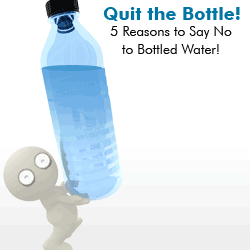
How do mosquitoes affect your water? One word...pesticides. With the goal of eradicating mosquitoes near crop harvesting areas, pesticides aimed specifically at mosquitoes have ballooned out of proportion.
Pesticide use in the agricultural industry began in earnest in the early 1940s. Although pesticide use had been quite popular for more than twenty years, government officials first became aware of the potential danger of pesticide runoff to humans in the early 1960s when Rachel Carson's famous and influential Silent Spring was published.
Though this book warned mainly of the detrimental effects of DDT (a popular insecticide developed in the early 1940s) for birds and other non-human victims, Carson's work inspired health officials to speculate about the effects of pesticide runoff on humans. Recently, exposure to DDT was linked to Parkinson's disease. Because of concern over DDT's adverse effects on the environment and on people, this pesticide was banned in 1972. Despite the ban of DDT, pesticide use continues, and the effects of some modern insecticides and herbicides can be just as debilitating.
Even through careful use, runoff from pesticides continues to make its way into drinking water sources.
What follows is a brief list of some of the more popular pesticides and their adverse health effects when ingested:
- Alachlor: Alachlor is an herbicide that has been used to control mainly grassy weeds in corn, soybean, and peanut crops since 1969. Intake of Alachlor can lead to eye, liver, kidney or spleen problems, anemia, and increased risk of cancer (Gustafson, 1993).
- Atrazine: Atrazine has been widely used as an herbicide on sorghum and field corn for several decades. When ingested, Atrazine can lead to cardiovascular and/or reproductive problems.
- Endothall: Endothall has been used since 1995 as an herbicide on sugar beets, spinach, and potatoes. Intake of Endothall can cause stomach and intestinal problems.
- Lindane: Lindane is an insecticide currently used on cattle, lumber, and gardens. Ingestion of Lindane can cause liver or kidney problems.
- Methoxychlor: Methoxychlor is a widely used insecticide for fruits, vegetables, and livestock. Intake of Methoxychlor can lead to reproductive difficulties.
The EPA lists maximum contaminant levels (MCLs) for the presence of each of these pesticides in drinking water. Unfortunately, these MCLs are not zero, and even a small amount of ingested pesticide runoff can have detrimental effects on the body.



